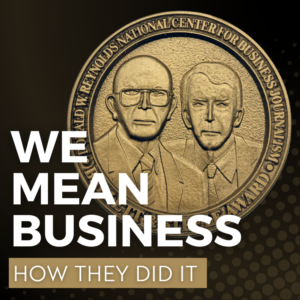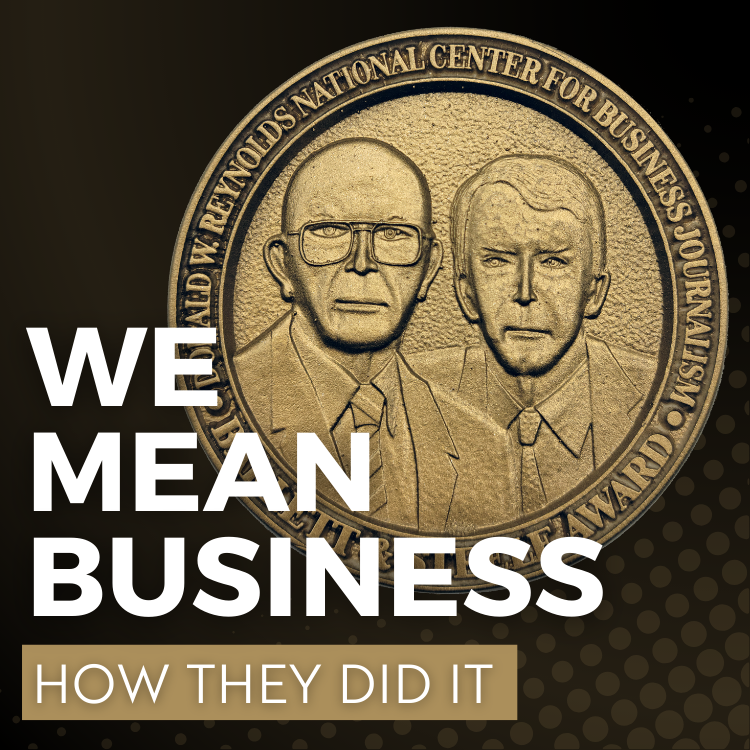

In this episode, Katherine Fitzgerlad and Eddie Keller interview Christopher Serres and Glenn Howatt of the Minneapolis Star Tribune about their award-winning investigation “Unchecked Care.” Their investigation exposed issues in the home care industry, including inadequate care, inadequate training for aides, and aggressive sales tactics by for-profit franchises. Serres and Keller give advice to new reporters on working with data and where to get started.
“Unchecked Care” won the Silver Award in the 2015 Barlett and Steele Awards for Investigative Business Journalism. Megan Calcote is the host of the How to Cover Money series. Check out the full four-part series:
[Intro music]
Megan Calcote: How to Cover Money: Behind the 2015 Barlett and Steele Awards Silver prize-winning investigation, “Unchecked Care.”
Christopher Serres: There’s a tendency we want to do everything quickly nowadays. You know, we’re being pushed in that direction with social media, with getting stories online quickly. But I think when you’re embarking on a big topic, you’ll achieve more if you just slow down. Slow down.
Calcote: Hello and welcome to the How to Cover Money podcast. We are coming to you from the Donald W. Reynolds National Center for Business Journalism based at the Walter Cronkite School of Journalism and Mass Communication at Arizona State University. I’m Megan Calcote, host of the How to Cover Money Podcast. Today, we bring you tips from Christopher Serres and Glenn Howitt of the Minneapolis Star Tribune, the reporters behind the 2015 Barlett and Steele Awards, silver prize-winning investigation, “Unchecked Care.” Chris and Glenn’s investigation explored dramatic growth in the home care industry, which was spurred by policies that encourage frail and elderly patients to receive care at home rather than at hospitals and nursing facilities. They uncovered cases of agencies leaving patients without care for extended periods of time, nursing aids with inadequate training performing risky procedures, and for-profit franchises using aggressive sales tactics. Katherine Fitzgerald and Eddie Keller of the Reynolds Center sat down with Chris and Glenn to discuss their award-winning project.
Keller: What sort of changes have you guys seen at the state level as a result of your reporting?
Serres: I think one of the big ones is, you know, the final installment was about fraud, and the state is now moving on creating a whole kind of background check system, fingerprint system for caregivers in Minnesota, which previously they hadn’t had.
Howatt: It’s the kind of industry that I think we need to keep watching, because the industry is going to continue to grow. The use of personal care aides, and home health aides is going to continue to grow. We still in Minnesota do not have inspections of these of these agencies, or surveys. We are not aware of the state being more proactive in looking at potential problems. For instance, going back to the beginning with the collapse of this large company, state officials knew at the time that this was happening, but they never took even the simple step of notifying clients that they need to be aware that this company was on the verge of going down and also finding them other care sources. So that’s still a problem.
Serres: What they have started to do is they have started to do inspections of home care agencies once they open up sort of a spot inspection to see if they’re for real. But that’s it. You know, there’s still a great deal of work to be done to make sure that the companies that say they’re in business, are still in business and are providing the cares that they like to be providing.
Keller: So what sort of tips would you give to new reporters and young reporters who don’t have a lot of experience coming through these large data sets? Kind of get intimidated by those things. Like, what sort of tips would you give to them?
Howatt: Well, it’s always important to start small. For one it gives you some confidence in what you’re doing, and it helps you understand, like if you work within a spreadsheet itself, and you you manipulate that and you play with it, that sort of gives you the confidence then to work with something that’s maybe a bit bigger. Because not only have you pushed the buttons and done the sorting and the like, but also you know something about the content and that helps inform you to doing something larger. So start small, go up the stairs.
Katherine Fitzgerald: What was it like, kind of coming through all that? How did you decide what would be the most important to this piece?
Howatt: Well, I did a lot of the data work for the story, and Chris did a lot of the shoe leather reporting. So data works when you integrate it with the reporting. So it was important for me to know what he was doing so I could look for places where I could back that up with data. So you’ve got to have the two interact a lot. The other thing is, there’s just some natural questions that come up with the data that you have, and you have to follow those. But this is the same with reporting as well, 80% of what you do never makes it into the paper. Either because there’s not room or because it doesn’t lead you to a significant finding. But it’s not a waste of time, it’s not a waste of effort. It helps you learn more about how the industry works, what matters to it. And Chris learned from some of the failures that I had and I learned from some of the reporting failures he had.
Fitzgerald: Do you see the way that you’re able to mix data and changing now that you can present things online and have you know more, like infographics, stuff like that? Have you noticed a change in that over the time you’ve been reporting?
Howatt: Oh yes, definitely. I mean, first of all, the capabilities to work with data now are so much better. Typically, when you got data from a government, you would get a computer print out that was three inches thick, and then you’d have to comb through it. Now you get electronic data. But also it helps to have people, in our shop, we don’t do the graphics or the online presentation ourselves. We share that with those people, so they then turn it into graphics or to online presentations.
Fitzgerald: So what advice would you give to other reporters when you’re working on a story and you realize there’s kind of something else going on if you uncover something, when do you know to switch?
Howatt: Well, it’s always important just to go where the story takes you. Now, we didn’t abandon the fraud angle. Eventually, one of the stories in the series was about fraud, but these other issues just were of more importance that a lot of our emphasis turn towards that. And it’s always important to keep an open mind. And the other thing, I think this is important in a newsroom is you’ve got to keep feeding information up to the management, so they’re not surprised. You know, they’re expecting one thing and we give them something else. So as soon as you find out that you’re going a different path, it’s important to get that message to the top editors and get their buy-in to where it’s going so you don’t run into problems later.
Serres: I think it’s really important when you get in going on a project early on, it’s okay to get lost. Be willing to just get lost in a topic. And I think we all, whatever we’re researching, whether we’re trying to understand a new topic, or whether we’re reading. We all have that initial sense of, let’s get lost in the topic first. Read as much as you can, go out and talk to as many people as you can. You have to kind of be willing to zigzag. And you can’t just pick a straight line and go at it from the beginning. I would just say as far as advice goes, just to take it slow. You know, I think that there’s a tendency you want to do everything quickly nowadays, push in that direction with social media, with getting stories online quickly. And there are certain things you do have to do quickly, but I think when you’re embarking on a big topic, you’ll achieve more if you just slow down. Slow down. Don’t be afraid to go back and interview the same people three or four times. Spend time with them in in their setting, in their lives, just be a real person and immerse yourself in their lives and take it slowly. And people will appreciate that, and they’ll open up to you more. Don’t just say, I’m gonna have an hour with you at the coffee shop. No, take a day. Take a day, go to their home. Take three hours, go to an art museum with them. You know, don’t get you know, try to do things that are unconventional, that help people think in unconventional ways and feel more open with you.
Calcote: Thank you, Chris and Glenn for sitting down to talk with us about your investigation “Unchecked Care.” If you’re interested in reading their award-winning work, the links to their four-part investigation will be included in the show notes for this episode. Just visit businessjournalism.org to find them. Applications are now open for the 2017 Reynolds Week in business journalism. If you’re a working journalist looking to learn more about covering money-related topics, or if you’re a university or college faculty member interested in teaching business journalism this week long, boot camp is for you. Visit businessjournalism.org, and click Awards and Fellowships at the top of the page to submit your application for this prestigious fellowship opportunity. Applications are due on Sunday, October 16, and space is limited. If you are in need of more business journalism training, the Reynolds Center can help. Visit businessjournalism.org to find articles and self-guided training, download our free eBook: Guide to Business Beat basics, or sign up for our weekly newsletter. The newsletter will keep you up to date on training opportunities from the Reynolds Center year round. If you enjoy the How to Cover Money podcast, make sure to subscribe on iTunes, Stitcher or SoundCloud, and while you’re there, leave us a rating or a review to help make this podcast more visible to other business journalists. Support for the How to Cover Money podcast comes from the Donald W. Reynolds National Center for Business Journalism. Join us on the next episode, we will share tips on finding local economic data from University of Michigan economist, Donald Grimes.
[Outro music]




Two Minute Tips
Every Tuesday we send out a quick-read email with tips for business journalism. Sign up now and get one Tuesday.
